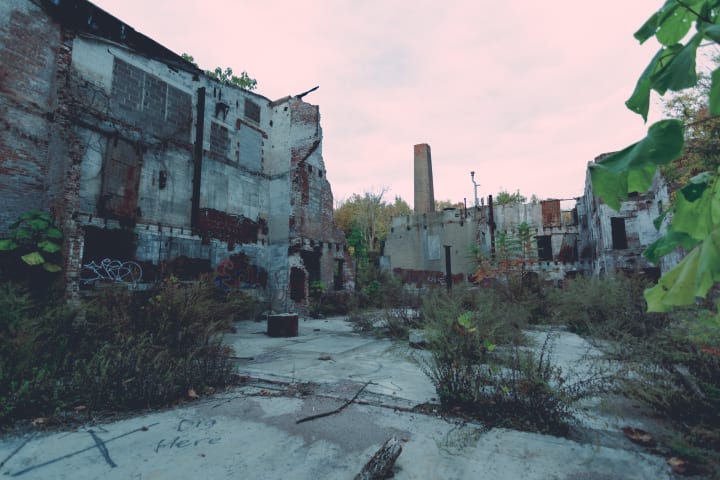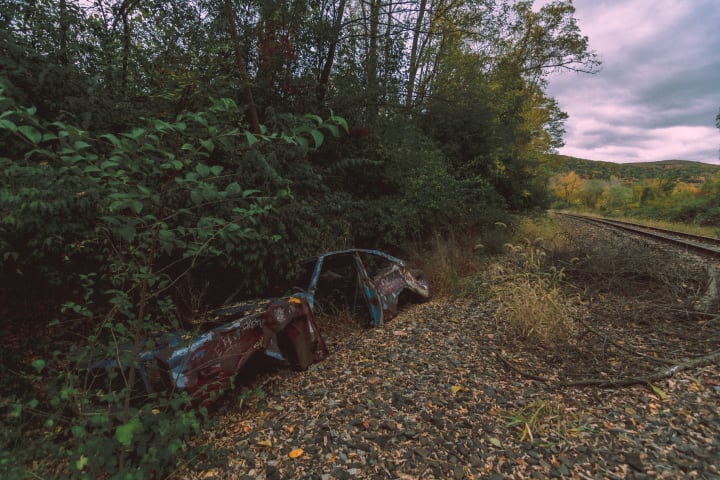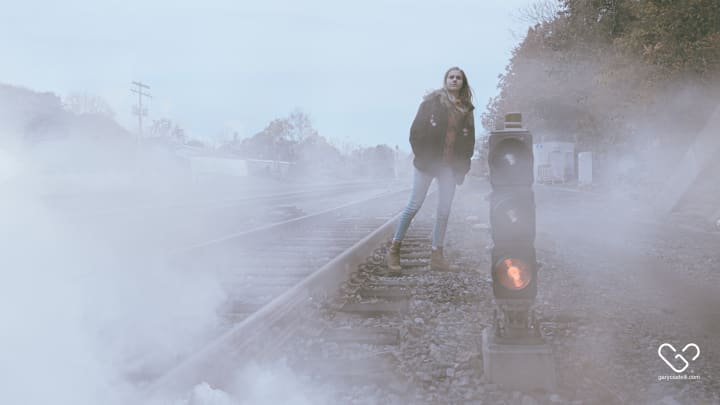THEY LIVE AND LET DIE
Part One: The Brightest Night

This is my photo story project. It's based on the 1988 film "THEY LIVE", directed by John Carpenter. Visit garycastelli.com/liveandletdie to view all the photography from the project.
The main character: Brea Basmeth, played by Australian model Holly Stanton, is an upstate New York-small-town girl living in a 1980’s Reagan-America. Like many people at the time, Brea found herself juggling many of the uncertainties of small-town life—when the largest employer in the area, the Isbeth Steel Mill, closed its doors in 1983. Many of the townspeople suddenly found themselves without work and with little hope.
Her story begins at home, on a dark cloudy afternoon. It’s now the tail-end of a three-day-long thunderstorm; very common in upstate New York around this time of year. Brea sits at the kitchen table reading the mail—across from a slightly opened window. Every-so-often a cool stormy breeze would blow-in; stirring a collection of bills attached to a refrigerator by a magnet—in the shape of a red-letter “B”. The low-distant hum of the washing machine in the next room could be heard over the news playing on the television in the living room corner.
Brea’s kitchen phone rings…
“Hello,” Brea answered.
A soft, anxious-sounding voice responds, “Brea is that you?” “Yes, who’s this?” Brea asks. The voice on the phone hesitates for a second and then responds, “It’s Grace!”
“In a surprised tone, Brea replies, “Gracie Isbeth?” “From school?”
“Yes!” “I know, it’s been a long time since we talked. I was calling to see how you were?”
“O.K.” Brea responds. “Just staying busy, working here and there, doing what I can.” “How are things on your end?” “How’s your mom and da--
“Listen…”, Grace interrupts— partially covering the receiver with her hand, and lowering her voice to a whisper, she asks, “If I sent you a package would you be the only one to receive it?”
“Sure, why?” “What’s in the package?”, Brea asked.
“…I don’t have a lot of time to speak, Grace’s voice growing noticeably more nervous. You’ll be receiving a package in two days. I have things I need to tell you, but I can’t say them over the phone, so I recorded them on a cassette for you—listen to it, then decide—you’ll know what I mean after hearing it. Take care of the items I’ve sent you and whatever you do—don’t talk to strangers.”
Strange voices can suddenly be heard on the receiver…
“I can’t say anymore—I have to go—I hope to see you again”, Grace says in an agitated tone—then the call ends abruptly.
Brea turns and leans against the kitchen wall; her eyes wandering around the room; processing everything that was said. The sound of a dial tone begins to eerily fill an empty house. Brea slowly hangs-up the phone.
She’s suddenly startled by the rattling of the kitchen window from a gust of wind. A distorted silhouette of a humanoid figure can be seen in the window’s beveled glass; clutching the collar of her plaid shirt, she quickly turns on a second kitchen light—only to realize it was just her reflection.
A sense of uneasiness begins to crawl up her spine. Slowly, she begins to feel like something unnatural was now tethered to her through the long, cold, twisting telephone line.
“Tonight, she thought, all the lights stay on.”
⬩2⬩
Two days came and went. Brea all the while anxiously waiting for this mysterious package to arrive. “It’s Saturday—the mail still gets delivered today, maybe it’ll be here later,” she thought. “I hope everything's alright with Grace,” Brea worried. By this time, she began to shake the eerie feeling she had three days prior. A sense of normalcy had begun to set back in. From her room, she could hear the loud distant crashing sound of David the clerk boy rolling up the steel gates to Mariun’s Pharmacy. “It’s 8 AM, I’ll go downstairs, make some breakfast—then walk to the pharmacy and pick up my asthma medication before the lines get long,” she thought.
Brea got up out of bed and began rummaging through her dresser drawers—looking for her favorite plaid shirt. Downstairs, the radio could be heard playing a mix of local stories, weather, and the usual hokey commercials you’d expect from small-town radio. She walked from her room down the stairs toward the kitchen in her favorite blue jeans and red flannel; wondering what she was going to eat while brushing her golden-blonde hair. Ambient sounds of children playing and families walking by could be heard outside her kitchen window past her home’s front garden. The neighbor’s children were blasting the television volume; it was, of course, Saturday morning. The one day of the week where you were glad to wake up early as a kid. Frantic channel and volume changing could be heard—as well as shouting for control of the remote. “You don’t want to miss your favorite cartoons,” Brea thought.
After breakfast, she grabbed her bag and walked out onto a sunny tree-lined street. She saw and waved to the Osterman’s, an elderly couple—who were driving by in their vintage red Ford—Model-A-Huckster pickup truck. The truck itself was a town celebrity in its own right, having been won in a drag race during grandpa Ostermans’ early years of bootlegging. They’d been here since the 1920s and knew pretty much everyone in town. They had helped Brea get through some tough times after her parents’ death some years back. She was very fond of them. Many of the old townsfolk settled here after World War 2, raising their own families under the shadow of the now-closed Isbeth Steel Mill. They’ve seen countless generations grow-up and leave town in search of a better life. With many of them not finding it, only to return and take up roots.
About fifteen years ago the Ostermans’ had lost their only daughter in a train wreck; the 6:21 evening-express out of New York City—derailed and crashed just outside of town. The train inspector’s official cause for the accident was “defective tracks”, but if you ask some of the locals’ they’d say, “it was pure greed that killed the Osterman’s daughter, along with all the other poor souls aboard that train.” “High Pond Bridge”—is where it all happened. The bridge could be seen off in the distance on a clear day when standing in front of Brea’s house near her rusted wrought-iron gate. The tragedy becomes more visceral around this time of year; its anniversary. For the next week, a somber feeling will begin to radiate across every home in town; with many of the families gathering in the evening at the local church to hold vigil in remembrance of the lives lost. Some old-timers feel the accident was a prelude of things to come as only a few years later life in the town would change again when the steel mill would close its doors for good.
The accident happened on a Friday; schools had just let out for summer a few days earlier; children were chasing the local ice cream truck down the street on their bikes. Phones all over town could be heard ringing from the calls of anxious teenagers planning their nightly gatherings. Elderly folk sitting in their rocking chairs, listening to the radio were a fixture at almost every porch in town.
That night a drama had been unfolding at the local courthouse. Its actors were comprised of lawyers, bankers, business owners, labor representatives, and ordinary townsfolk. Yelling and screaming could be heard through the newly painted courthouse doors and windows. This only meant that the production was in full swing and with dinner time quickly approaching; it would soon reach its climax. The cast—with all their posturing and chest-thumping, were fully committed to their roles, rivaling that of a troop of orangutans from some low-brow traveling vagabond circus. A common sight when the Isbeth Steel Mill was the main topic of its proceedings. The courtroom antics would come to an immediate halt when a group of young boys and girls who were playing by High Pond Bridge just outside town came rushing in past the courthouse guards. In a loud voice, one of them yelled, “the train crashed, the train crashed—come quick!” The room turned silent; all eyes from every corner of the overpacked courthouse turned towards the children.
A mob of people began swarming out of the building into the humid, evening air. Within minutes a frantic atmosphere had begun to envelop the locals. Calls to firefighters, police, and neighbors were being made all throughout town. Small pockets of people began to spring up along the streets leading towards the end of town where the bridge was. The loud, anxious-sounding barks from dogs all over town could be heard through the vehicle sirens from first responders as they sped by.
⬩3⬩
People started coming out of their homes, gathering by their front yards. The red-flashing lights of sirens painted the exterior of every face and home across town. A forgettable, small sleepy town in upstate New York would eventually become the focal point for every newspaper reporter within a 50-mile radius.
If no-one knew there was an accident, they would think a concert was taking place at the entrance to High Pond Bridge with all the flashlights and people gathered there. The small under-equipped police force that was on the scene did their best to keep people from the wreckage, but soon crowds of people overwhelmed their positions. People were climbing on top of trees and standing on the hood of their cars to get a glimpse at the train devastation. Calls for assistance were radioed into neighboring counties. Screaming and crying could be heard as the grotesque mangled corpses began to be carried away by medics and police.
The train’s dining car was ripped open.
Sharp slices of jagged metal protruded outward like the ribs of a half-eaten animal carcass. The seats, lounge chairs, and exposed wiring—the guts, all poured out into the humid summer night air. The corpses of passengers and train workers from the doomed voyage were easily in view at the base of High Pond Bridge. Some of the bodies fell into the river below and washed downstream towards the steel mill; others would never be recovered.
St. Lukes Medical Center became inundated with corpses from the wreck. Bodies were brought into the morgue every few minutes. Medical examiner space quickly ran out; body bags began to line the corners of the morgue resembling piles of sandbags that belonged to a fortification from some long-forgotten war.
Some corpses were so badly burned or mangled that no positive ID could be made. Family members flooded the emergency room searching for news about their loved ones. A mix of cries, yelling and the inaudible chatter from police and first responder walkie-talkies overwhelmed the quiet, peaceful ambiance that had been there in the St. Lukes Emergency Room only moments before. Every few minutes people would maneuver across the blood-drenched hospital floor towards the sound of an approaching ambulance siren in the hopes of seeing their loved-ones alive.
Hope is a dangerous thing to have in the space of the unknown.
Survivors were rushed-in on blood-soaked stretchers. Numerous trails of blood from the rusty, squeaky wheels of gurneys were tracked along the cold, white hospital floor. Blood smeared footsteps were scattered in every direction up and down the hallways. It was as if someone choreographed a group of people dancing the Viennese Waltz with red, wet painted shoes.
Soon after, an intense criminal investigation was underway. It was eventually discovered that Trevor Isbeth, the owner of the Isbeth Steel Mill; the largest employer in the county, had neglected his contractual responsibility in maintaining the town’s train tracks. According to the deal made with the city, he was responsible for the upkeep of the tracks within a five-mile radius of the town. The City Council would in-turn grant his mill “special” tax-breaks and labor-law protections. Clandestine and shady dealings became all too a normal affair during the height of the mill’s operation. But as time went on, Trevor began to demand more and more special financial treatment. Being one of the largest employers in the county, the mill began to exert more and more dominance over the town and its regulators. Too late in realizing how much power the mill now had, the City Council took a stand and refused any more of Trevor's demands. In retaliation, Trevor began neglecting his contractual railroad maintenance obligations. The tracks slowly began to show signs of neglect.
Railroad inspectors made countless demands prior to the accident for the worn steel of the rails to be replaced. But neither the mill ‘nor the city took responsibility for the work that so hastily needed to be done.
These were the stories told to us as children. But as Brea exits the pharmacy, she could hardly see evidence of such a time, by this hour of the morning the breakfast rush was at its peak. Cafes and diners began filling up to capacity. The town came alive with a steady build-up of foot and car traffic. Porches and streets became pseudo playgrounds. “Garbage Pail Kids” and “Dinosaur Attack” trading cards were being traded with an intensity to rival that of the New York Stock Exchange. Fathers were spraying themselves with a familiar scent of summer; bug spray.
Radios being tuned to their favorite stations would be for nothing as the roaring of lawnmower engines drowned out anything that could be heard. Brea noticed the mailman dodging Lego bricks along the sidewalk near her house; “I wonder if he delivered anything,” she wondered. She quickly walked-up her street in anticipation, peeking over the neighbor’s tall bushes along the way. She turned into her mother's flower garden and saw a small, brown package by the corner of her porch.

⬩4⬩
While carefully carrying the box inside she noticed that there was no return label, just a brown box with several stamps stuck on the side for postage. She placed the worn, beat-up brown box on her kitchen table and began to slice through the packaging tape.
She flipped open the flaps and removed some of the protective bubble wrapping to reveal: a yellow Walkman with bright orange headphones, a pair of double-A Eveready batteries, a new black Casio digital watch, a pair of maps packaged in a protective plastic sleeve; a folded N.Y.C. Subway Map on one side and a land survey on the other, some cash rolled up with orange and brown rubber-bands, and a cassette tape with the words “listen carefully” scribbled on both sides in black magic-marker.

Brea loaded the batteries into the Walkman, inserted the cassette, put on the bright orange foam earpads, and gave the “play” button a nice downward push until a noticeable “click” could be heard. She begins to listen. Nothing but the sounds of static at first, then the fumbling of what sounds like boxes being moved about, followed by a door being closed and locked.
After a few more seconds a voice is heard…
“Brea, I hope this recording finds you well.”
“I know it’s been a long time since we spoke and I wish I didn’t have to communicate like this but as you can recall from our last chat, the phone isn’t safe for me. I first would like to say that, ‘I always felt sorry for what happened to you and your family.’ They were sweet and always looked out for me. They made me feel like a daughter to them, and I needed that growing up. I have so many great childhood memories from being around them, but as you know, that didn’t last very long. I always felt horrible about what happened between our parents.”
The anxious, worry-filled voice is that of Grace Meara Isbeth, the once heiress to the Isbeth Steel Mill fortune. Her family—once the toast of upstate New York; employed whole towns across different counties—now they were the most loathed family since her father closed the mill; putting over a thousand people out of work.
“I don’t want to remind you of how bad things used to get in my house, how my father wasn’t around, or my mother would get drunk and…
…forget it, I’m going off-topic, sorry.”
“I know we’re not welcomed in the town anymore, but you and I were always friends and I hope—I can, now years later—still count on that friendship.”
“I have a creepy story to tell you.”
⬩5⬩
It’s about what’s been happening here at home, and it might have something to do with the mill, which is one of the reasons I reached out to you. Have you seen my father or noticed strange things happening around town? Any new groups of people hanging around town or the mill?
“What a strange question,” Brea thought. But after the call the other night it might not be so strange after all.
“Yes, I know he was run out of town ever since he closed the mill, and it wouldn’t be safe for him there, but I’m sure he’s been back, even as recently as a few nights ago, but for what reason I don’t know.”
“Let me explain. For the last couple of weeks, he’s been leaving the house around midnight. I didn’t think anything of it at first. I figured he has business dealings all over—but the last couple of nights he hasn’t come home alone”.
An underlying sound of static and white noise would creep in-and-out of the recording—at certain instances, the distorted sound would—for a second—resemble voices.
Just not human voices.
“Two nights ago, I woke up to the sound of his truck pulling into the driveway. With the bedroom lights off, I walked over to my window which overlooks the garage. It had been raining through the night, a fog had set in. I could see dim, faint silhouettes of people climbing out of his truck. They were all unloading and carrying boxes down the cellar. I started getting nervous.”
“I couldn’t make out their faces.”
“They were only downstairs for a few minutes before my dad walked them out of the basement and out past the gates toward the end of the driveway.”
“The next day I asked my mother about it, but she was in one of her drunken stupors. She said, 'I was just being paranoid and that it’s probably some of my father’s business partners.' ‘Pay no-mind', she said. She made a joke about how they were probably some of the business partners he had lost money with, or maybe he was working as a cab driver now and he was dropping off his fare. It was a stupid thing to say. Even now after all these years, I can’t have a straight conversation with her. You know how she is.”
“My mother does blame him for everything though. According to her, he should be working day and night to make up for the loss. She, in all her wisdom, said to ‘just forget it 'and to do as she does— ‘shop ‘. But not before she asked me to get her another ‘Manhattan’ on the rocks.”
“I would ask my father about it if he were ever in the house for longer than five minutes.”
“I’m really on my own with this. So, I began locking my bedroom door at night and it was a good thing I did too.”
“Around 5 AM the other morning, something so eerie happened. I’m getting chills down my spine from just thinking about it. I was in bed asleep. I awoke from footsteps coming up the stairs. My parents’ room is just down the hall, so for a second, I thought it was my father going to bed. But the pace of these footsteps seemed to move at an uneven rhythm, I didn’t recognize them. Suddenly the footsteps stopped. I turned over in my bed to face the bedroom door, only to see a person’s shadow at the bottom of my door.”
“I can’t tell you how frozen with fear I was. Thank God I locked that door. This figure just stood there.”
“Then I heard it...breathing. All I could hear was...it breathing.”
“I was so afraid; it was the scariest few minutes of my life. I was too scared to even call for help, I didn’t want to make a sound. I just hoped it would go away. All I could think of was that it was one of those people my father brought home wandering around the house. Eventually, it went away.”
“When I came out of my room later that morning, I found muddy shoe prints leading from my door down the stairs into the basement. I grabbed one of the pokers from the fireplace, turned on all the lights by the doorway to the basement, and gathered enough courage to go down there. I noticed that the keys to the mill were missing. More importantly, I found a pile of dirty clothes that didn’t belong to my dad; old jeans, shoes, shirts—it all had the same smell and stains that we used to come home with as kids after playing near the mill. That chemical smell from the leaky containers that would sit outside by the back of the mill near the river.”
“It’s all the same. This is why I think he’s been traveling up by the mill and not alone it seems.”
“Other weird things have been happening. I’d be watching T.V.—when suddenly a distorted video of a man’s face would appear on my television screen. The picture was grainy, I couldn’t make out what he was saying, it only played for a few seconds, and gave me a horrible headache. I’ve heard other kids in my school mentioning the same thing happening to them.”
⬩6⬩
“Now, this last part is what made me want to call you.”
“The next morning, I was in school; sitting at my desk, class was about to end—suddenly I heard shouting and screaming coming from the hallway. At first, I thought it was kids goofing off; maybe out cutting class—but then I heard walkie-talkies. My classroom went silent; then I realized the shouting was coming from adults—not students. At that moment, the bell rang—everyone rushed out of the room towards the direction the noises were coming from—including me.”
“When I walked out into the hall, I saw the principal and some of the faculty being questioned by police. Men in black suits were clearing the hallways, shoving students and teachers back into their classrooms. It was a mess—students being pushed and shoved into whatever classroom they happened to be nearby, including me. In the room, people were either talking to each other in small groups or they were trying to get a peek into the hallway through the small porthole window in the door. I walked across the room towards the large windows facing our schoolyard and saw three parked police cars. “
“Suddenly I heard screaming by the door. I ran across the classroom—pushing and squeezing through a crowd of seniors; I wanted to see what it was. At that moment I saw police carrying off my science teacher; Mr.Heilwig.”
“A moment later I heard another voice, it was Cathy, my lab partner, she was being taken away in handcuffs—I should have just stayed put, but in a panic, I opened the door and ran out into the hallway. Teachers and guidance counselors were in the hallways talking to one another, trying to find out why our science teacher and Cathy were arrested.
I can tell you that no one knew what was going on. Things were crazy.
I turned around and saw that I was cut off from the room. Two officers were walking up the hallway, questioning and harassing anyone still wandering the halls. I decided to head straight to my homeroom. I managed to get to the end of the hallway and as I was about to turn the corner, I heard walkie-talkies and the jingling of keys coming toward me. There wasn’t any place for me to hide, so I ran into the boys’ bathroom—it was empty. I waited in one of the stalls; hiding, listening. After a few seconds—the sounds passed by the bathroom. I slowly opened the door and peeked into the hall; I didn’t see or hear anyone, so I continued on towards my classroom. My mind was so preoccupied that I forgot that Mr.Heilwig’s office is next to my classroom.”
Brea paused the tape. Sat back in her chair and tried to imagine what Grace was going through. But what she left out of her story; Brea could only envision.
As Grace turned the corner; a bright ray of sunlight from
Mr. Heilwig's office doorway pierced the shadowy vacant school hallway. Grace put her back against the adjacent wall and quietly slid towards her classroom door. Shadows of people moving back and forth could be seen along the opposite seafoam green-colored wall. She managed to walk past his office without attracting any attention. But she couldn’t resist—with only inches away from her room’s doorknob, she stopped—turned around—and carefully peeked into his office.
Her eyes squinted as she peered into the bright-dusty, sun-drenched room. Black suits moved about, entering and leaving through the Emergency Exit in the back of Mr.Heilwig’s office. They resembled a colony of black ants—the kind you’d find along cracks on a concrete sidewalk during a hot muggy day. Their arms—the mandibles—carrying brown cardboard boxes like sugar cubes back to their hive.
With all the movement about, she managed to overlook one drone—standing still against the opposite side of the room near an opened, gated window. But he noticed her—and like a shadow that had peeled itself from the wall—he walked towards her in the same uneven rhythm she heard in her house only a few nights ago.
⬩7⬩
It was hard to make out the features of his face as he walked closer and closer. Grace slowly backed away from the doorway as he walked closer and closer. The drone stopped at the doorway for a second, looked at her—then slammed the door shut—locking it.
She then heard it again, that unforgettable heavy breathing.
Grace with eyes and mouth opened wide—horrified from the realization—began to slowly step back from Mr.Heilwig’s door. Without hesitation, Grace charged past her homeroom door and out through the front entrance of her school.
Brea sat forward in her chair and continued to listen attentively to Grace’s message.
“I know for certain that all these things are connected—and I’m scared...very scared. The hairs on the back of my neck stand every time I hear footsteps down my hallway at night.”
“You have no idea how I wish I could go back by you, but I know it’s not safe for me there because of the mill. So, I’d like to ask— would you come stay with me for a few days? I know that’s a lot to ask for, but I need a friend; someone I can talk to, someone I can trust. I could really use your company.”
“I have family in the next town; my cousin would help get you here. Her name is Madeline, she’ll be visiting her grandmother in Port Jervis for a few days. With her help, you’ll have an easy time getting over the Hudson River. She’ll drive you into Beacon and then you can take the train into N.Y.C.
“I’ve included a copy of one of my dad's land surveys. At one point he was thinking about expanding the mill into towns that were closer toward the Hudson. I’ve drawn a line representing the best path for you to take towards Port Jervis.

I know you’ve been there before and know the way, but use the survey just in case something happens, and you need to use a few side roads. From there you’ll catch a bus over to the town of Newburgh. I’ve also marked some ‘red X’s’ on the map. These are towns you should avoid along the way. There are a lot of empty woods, side roads, small, abandoned towns, and factories between you and the town of Beacon. Towns with lots of people who are out of work. People with nothing to do but cause problems for anyone not local.”

⬩8⬩
These are the people and places I want you to avoid.”

“At the end of the line is a green circle that shows where Madeline would pick you up, if…you decided to make the trip.’’
“I really think someone is listening in on my calls, which again, is the reason for this cassette. I could just be paranoid, but to be on the safe side, if you decided to come, just call my number and wait for the answering machine to pick up. Then, say one of your poems; the kind you used to write in Mrs.Eberman’s English class when we were kids. No one else will know what the message would mean except me—then hang up. I’ll then call my cousin from a payphone down the street and let her know you’re on your way. If by chance someone picks up when you call, then hang up, and try again until you get the machine.”
“Please make your decision and call by noon Monday as my cousin is only visiting Port Jervis for a few days. I wrote her grandmother’s number on the N.Y.C Subway map. Call it when you get to Port Jervis. She’ll be waiting for my call as well.”
“I hope you decide to come. It would be great seeing you again.”
The “play button” on the cassette player springs up.
Side A has finished playing.
TO BE CONTINUED…

About the Creator
gary castelli
I'm a illustrator, photographer, and designer living in New York.






Comments
There are no comments for this story
Be the first to respond and start the conversation.